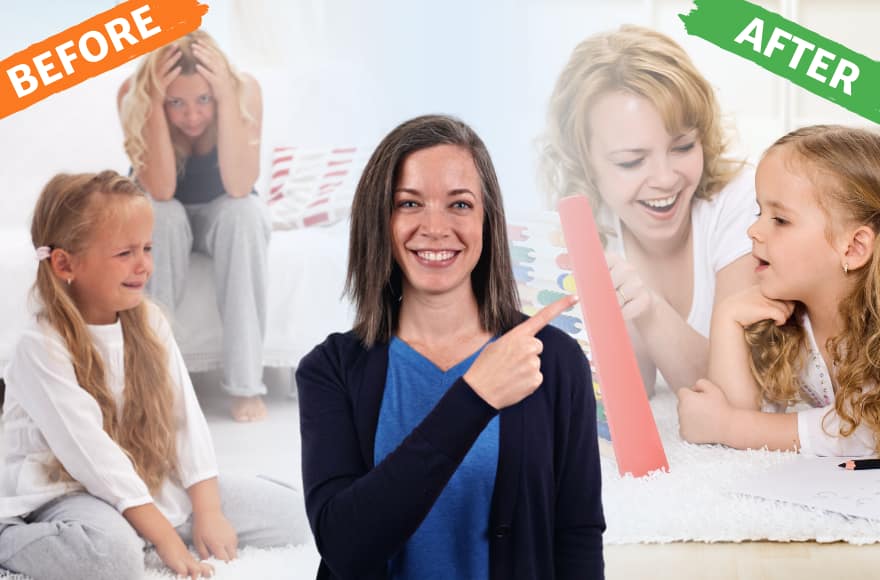Video Transcript & Notes:
If you watched my previous video about how to do special time, you know I think that spending 1 on 1 time playing with your child is one of the best ways to improve kids’ behavior and prevent behavior problems from happening in the first place. But, there are some things that we, as parents naturally do, that are actually not so great for special 1 on 1 play time. These are things that we need to actively think about NOT doing, so that we make sure kids are getting the right kind of attention. In this video, I’ll talk about the things you want to avoid during special playtime so that you can build that positive emotional connection.
And if you want to learn about what’s best to say and do during special play time that gives kids the kind of attention they crave and helps us parents feel less stressed and more confident – go watch my previous video and then come back here to finish this one.
Let’s jump right in. The first thing to avoid during special time is asking questions. This might be the toughest rule, in my opinion. Many parents (myself included) just ask questions naturally. But, try your best to avoid asking any questions during this 1:1 special time. When you start to ask a question, catch yourself and say it in another way. So, instead of “What are you doing with the playdoh now?” (Rewind?) Try, a statement of information or just make a guess like, “it looks like you’re making a house with the playdoh.” Why no questions? They take over the activity and conversation. They move it in a direction that your mind was going, not your child’s. Questions also require an answer, and your child may not want to answer. Or questions could also suggest that you’re not really listening to your child. If you have trouble with the no-questions rule, try to make yourself the subject of a statement instead. Let’s say your child said something, and you’re not sure what they said. Instead of asking a question like, “what did you say?” Just make yourself the subject of the sentence instead, and say, “I didn’t hear what you said.” Or, instead of asking, “what should we play now?” Try saying, “I wonder what we’ll do next.” It’s just a statement with yourself as the subject – you’re the one doing the wondering. So, no questions during special playtime. Questions are absolutely fine outside of that.
The second thing to avoid is: TELLING YOUR CHILD WHAT TO DO. Your child is in charge during special time. Avoid giving instructions or suggestions. So, things like, “Could you come sit next to me to play?” This is an instruction, also a question. You could say, “I would really like to sit next to you.” Or, you could just move next to your child. Or just wait for them to move a bit closer, and then comment on how they did that. You’re keeping the interaction positive, by avoiding telling your child what to do. Telling your child what to do also includes phrases that start with “Let’s” like, “Let’s build a tower together!” These types of suggestions put you in charge, and you start to take over the play. Of course, outside of special time, you need to be in charge, since you’re the parent. But special time is a positive time where your child gets to be the director and choose.
Third, and this one might seem more obvious, because special time is supposed to be a positive thing, it’s to avoid criticism and negative words. So, that means avoiding saying things like, no, don’t, or stop. By the way, I have a whole free pdf with examples of what you can say instead of things like, “please stop whining, or don’t throw toys.” and you can get that from the link in the description. Also, another form of this kind of negative language is sarcasm. So, try to avoid that during special time too. Young kids don’t always understand sarcasm as a joke or something playful since they tend to take things more literally. Things like sarcasm and more critical words or comments can show disapproval and lower kids self-esteem. And those can lead to some not-so-great feelings between kids and parents, which is the opposite of what we’re trying to achieve with special time. So, during special time, do your best to avoid the criticism, even if it’s constructive, and the sarcasm.
So, you’ve got some ideas about how to make the most out of special time with your child, how to fill up their emotional tank with the kind of attention they need, but you might still be thinking… “well, my kid still does this specific thing that I really wish they didn’t.” Maybe they’re in a big whining phase, or maybe they get physical whenever they get frustrated. If you really want to focus on fixing one thing that’s become a problem, check out the video below to learn how to use special time, and other times throughout your day, to do that.
Also, if you found this video helpful and want to say thanks, be sure to tap the like button and subscribe. It motivates me to keep making more videos for families who need it.
